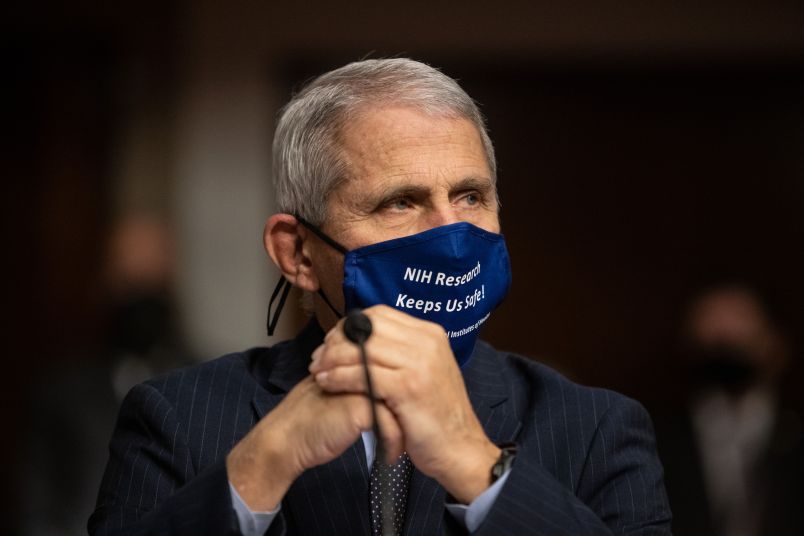Dr. Anthony Fauci in a recent interview addressed a growing distrust in public health agencies as the coronavirus continues to rage across the country and the message from President Donald Trump remains one of almost nonchalant resignation to a virus that he has suggested will — as if by magic — disappear.
The infectious-disease expert remarked on the “building distrust” toward government health officials during a taped interview with the Council of Inspectors General on Integrity and Efficiency made public earlier this week and first reported by the Project on Government Oversight.
“We’ve got to admit it, those of us in government, all of us, you and I and all of the people that work for me, and all the people that work for you, that there is a building distrust now in the transparency of what we do,” Fauci told the group of government watchdogs, adding: “It’s the elephant in the room.”
Fauci said that confidence in public health recommendations depends on transparency.
“If you’re going to make scientific-based public health recommendations, everything has got to be transparent,” the public health expert said.
“Otherwise once you lose the confidence of people, they don’t believe what you’re saying or they believe you’re holding things back or they believe there’s a political motivation to things,” he added.
The comments come as President Trump has repeatedly misled the public about the severity of the coronavirus, minimizing its impact and potential dangers for months as thousands of Americans contracted and died from the virus. In an apparent effort to regain footing in the presidential election that is now just weeks away, President Trump has repeatedly sought to paint a rosier picture of his handling of a virus that has now killed more than 221,000 people in the United States.
“The issue that people say you don’t want to alarm people is totally nonsense,” Fauci said, adding: “We’re a pretty strong country. We can handle the truth.”
The remark follows repeated accusations from President Trump in July that Fauci was “a bit of an alarmist.” In September he falsely suggested that the nation was rounding the final turn on the COVID-19 crisis, even as cases continued to surge and Fauci was encouraging Americans to “hunker down” in preparation for what might be a challenging winter with cases far from contained around the country.
Even after his own diagnosis with coronavirus, Trump has peddled mistruths about the disease, suggesting after he was treated with a cocktail of steroids and experimental drugs that he hadn’t really needed them and that immunity to the virus was guaranteed after someone is infected with coronavirus and recovers.
Fauci, who has directed the National Institute of Allergy and Infectious Diseases for 36 years, has far-reaching experiences with responding to public health crises — from HIV/AIDS in the 1980s to Zika more recently.
“If you go back over outbreaks in the past, the one thing that has always prevailed as the things that make things work is when people are open and honest and don’t hold information back,” he said, later adding: “we should come back and always tell the truth.”



